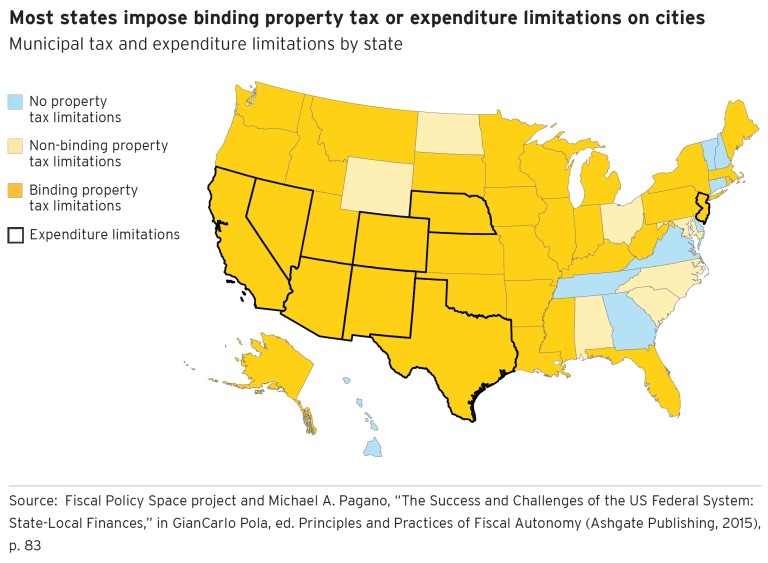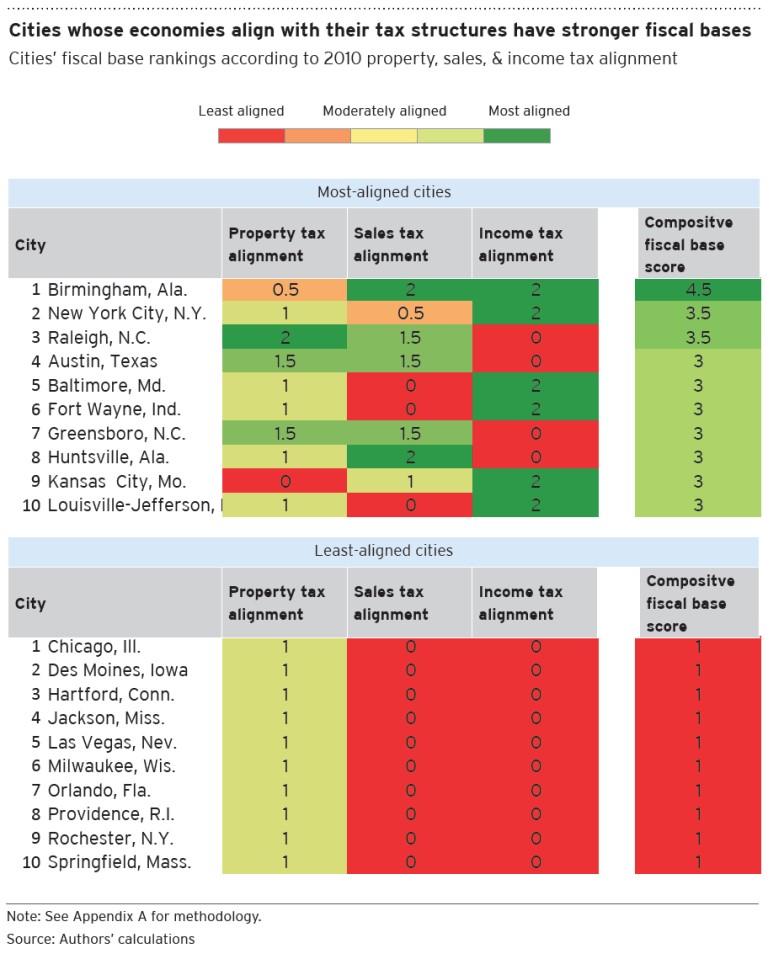Connecting state and local government leaders
Despite calls for local control, communities are only given a limited set of tools and are facing historic fiscal pressures. That could be a looming problem for many cities, according to a new report.
The New York Times’ columnist David Brooks last month celebrated the power of government that is closest to the people. In a piece called “The Localist Revolution,” Brooks championed “the belief that power should be wielded as much as possible at the neighborhood, city and state levels" in light of a dysfunctional federal government.
It’s a beautiful sentiment, but the reality for local leaders in the face of the federal government’s ongoing retreat will probably be less idyllic.
The day before Brooks’ ode to local leadership, the Brookings Institution released “City budgets in an era of increased uncertainty.” The report examines which cities might have the financial tools and resiliency to succeed in an era where the federal government is abdicating many of the roles it took on for the past half-century, ranging from environmental protection to disaster response.
“Cities in the United States are likely to shoulder additional responsibilities during the Trump administration, as federal leaders seek to cut the federal budget and workforce and reduce regulatory authority in Washington,” the report states. “Yet cities’ revenue sources and budgetary constraints vary greatly, shaping their ability to carry out new mandates or raise additional revenues.”
Authors Michael Pagano, president of the Government Finance Research Center at the University of Illinois at Chicago, and Christopher Hoene, executive director of the California Budget & Policy Center, are well acquainted with this topic. For years, the duo tracked the fiscal health of city governments together. Now, Pagano and Hoene provide a stark view of what localism imposed by federal retreat means.
While the authors may agree with Brooks’ sentiment that local solutions are preferable, they point out that actually exercising that authority and control isn’t necessarily an option for every city. Certainly, there are the cities that have the financial tools and flexibility to succeed during a time of federal retreat. But cities must also deal with state preemptions, mandates, and historical pressures that might put them—and their citizens—on a difficult path.
Ultimately, these factors divide our nation between the “haves” and “have-nots.” These haves and have-nots are not individuals, though, but cities. And that inequality does not break down exactly how many would suspect.
City leaders’ power to change local communities is often limited by the taxes and revenue the state allows them to collect. All but a handful of states restrict cities to a few ways of raising money, and many have specific “tax and expenditure limits.” Colorado, for example, places significant restrictions on local governments’ tax and spending growth. Taxes may need to be adjusted downward during boom times stymying savings for bad times. This meant that many local governments in the state—as well as the state itself—had trouble reacting to the Great Recession, not to mention digging out from losses in revenue. The law also doesn’t take into account growth in costs of services (think health care and Medicaid) or the cost per pupil for schools following population growth.
In the Brookings report, the authors also point to the recent Republican tax reform bill that capped federal deductions of state and local taxes. Deducting state and local taxes from federal taxes has been a feature of the intergovernmental partnership since the Civil War, and some would argue a staple of federalism since the Federalist Papers. It’s now a feature of a lawsuit by four states that are arguing the law “interferes” with their ability to make policy decisions.
The federal bill’s cap on deductions, as well as eliminating other financial tools for local governments, reflects the breakdown of the intergovernmental partnership between the federal, state and local leaders over the last few decades. These type of limitations can often create a misalignment between smart tax policy and the city’s strengths, according to Pagano and Hoene.

“Municipal budgets are strongest when they have diversified revenue streams and when cities’ taxation system aligns with their economies,” Hoene and Pagano write. “A city with high overall property values should ideally have a taxation structure that collects a sizable amount of property tax revenue, just as a city with high rates of retail sales should collect a sizable amount of sales tax.”
The U.S. cities that Hoene and Pagano cite as having well-aligned tax bases sound like someone threw darts to a map; Birmingham, Alabama, New York City and Raleigh, North Carolina claim the top three spots. The lowest rungs are just as varied, with places like Chicago, Des Moines, Iowa, Hartford, Connecticut and Jackson, Mississippi having the poorest alignment to their tax base.

State restrictions cannot be blamed for all of the cities’ woes, though.
“Cities with greater rental unaffordability, higher shares of Democratic voters, and larger public unions face greater fiscal pressures,” according to the report. The report essentially correlates these three factors with a stronger public demand for government services. The cities that fit this mold tend to be the largest ones in the country, “located in the Northeast, Midwest, or West Coast.” According to the authors, the pressure from these factors may be prohibitive if cities need to raise rates to compensate for federal retreat from certain sectors.
Conversely, the report finds “[c]ities with the least demand for public services tend to be mid-sized and located in the South, Great Plains, and Mountain West”—and, yes, more politically conservative.
.jpg)
Hoene and Pagano explain that the solutions are self-evident: more autonomy for cities, encouraging tax structures aligned to local economies, and setting the public’s expectations correctly around the costs of services. They note that these are far from “’easy fix’ solutions,” pointing out that “these policies would require the reversal of trends that have acted to limit cities’ fiscal policy space over the past several decades.”
The uptshot? If we are serious about giving more decision-making power back to the local level, it is important to give communities the power they need to forge their future.
“This imperative is particularly salient in an era of federal devolution of power and responsibility,” Hoene and Pagano write. “Ultimately, expanding the fiscal policy space of cities will serve to increase economic growth, prosperity, and inclusion for the nation as a whole.”
David Brooks’ piece is an important acknowledgement of public service at the local level in a country obsessed with national politics. It also has roots in an old-fashioned small government conservative ideal that stretches from Thomas Jefferson’s ‘yeoman farmers’ to the GOP revolutionaries who were part of Newt Gingrich’s “Contract with America.” Community solutions is an idea both parties should ultimately embrace, even when it is politically inconvenient—and especially as technology allows even small governments to find outside support to effectively manage large issues.
However, the dream of local decision-making constantly rubs up against the reality of federal and state-imposed limits on local power. Cities are faced with what the former executive director of the National League of Cities, Donald Borut, used to call “shift and shaft federalism:” where the federal and state governments transfer mandates, costs and responsibilities to local leaders.
According to Pagano and Hoene, that concern becomes all the more real under the Trump administration, “a new era likely to be characterized by antagonism, greater fiscal obligations for state and local governments (as likely under infrastructure reform), increased regulatory interference in some arenas (particularly on immigration policy), and heightened uncertainty.”
A major retrenchment from the federal government, they argue “might be viewed as akin to a significant economic shock, with recession-like implications for cities.” With many cities restricted in how they can respond, some regions of the country could be in for a bumpy ride.
Mitch Herckis is Senior Editor and Director of Strategic Initiatives for Route Fifty. He is based in Washington, D.C.

NEXT STORY: For Addicted Women, the Year After Childbirth Is the Deadliest




